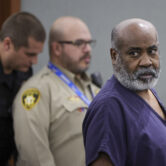MINNEAPOLIS (CN) — The judge hearing the cases against four fired Minneapolis police officers charged in the death of George Floyd affirmed Thursday afternoon that new filings by prosecutors and the defense will be made public without delay.
Assistant Minnesota Attorney General Matthew Frank requested the 48-hour hold after defense attorney Earl Gray, representing fired rookie officer Thomas Lane, submitted a motion on Monday seeking the admission of evidence regarding Floyd’s prior arrest on May 6, 2019, and body camera footage from that incident. Hennepin County Judge Peter Cahill had previously ruled that evidence inadmissible, but “left the door open” for reconsideration once body camera footage was available.
Gray’s motion was initially submitted to the court but never formally filed, Cahill said, drawing a distinction between the two requests. Court clerks, he stressed, need to process submitted documents before they could be considered filed. In the case of Gray’s motion, he had requested that the submitted documents not be filed until Frank’s request for a delay was resolved.
In a brief emergency hearing lasting just over 30 minutes, Frank argued that the attention media outlets bring to new filings like Gray’s motion interfered with the former officers’ right to a fair trial, and allowed Gray to effectively put inadmissible evidence into the minds of potential jurors without vetting from the court.
“Just by emailing things to the court, they become automatically public,” he said.
“We can make arguments about tainting a potential jury pool with admissible evidence, but inadmissible evidence is a particularly specious problem,” Frank added. “All we’re asking the court to do is to prohibit public access until the court has made a determination about the evidence, or until the case is resolved.”
Widespread public interest in the case and concern over prejudice has brought a coalition of media outlets into the case several times to argue for the broad release of documents and evidence in the case. The media coalition, represented by Ballard Spahr attorney Leita Walker, joined Gray in opposing Frank’s motion.
“I think it’s disingenuous for the state to start talking about process, and how one of the defendants is ignoring process,” Walker said via telephone. “The way the state has approached this whole matter is unconstitutional.”
She also noted that if the state succeeded in its motion, the media outlet had the option of pursuing information directly from the state attorney general’s office through Minnesota’s Government Data Practices Act.
“Our position is basically that there’s no compelling interest here because the cat is out of the bag. Mr. Lane’s transcripts are out there, the memo is out there,” Walker said.
“If you’re going to restrict the exhibits,” she added, “you’re still going to have a hearing, and I can’t imagine the state saying to close a public hearing in a criminal proceeding.”
Gray, meanwhile, pointed to what he saw as hypocrisy on prosecutors’ part. Shortly after he made his filing, he said, Frank filed a 44-page memo featuring descriptions of Floyd’s May 25 arrest and several past incidents in which his client’s fellow officers Derek Chauvin and Tou Thao were involved.
“We all know half of those won’t make it into evidence,” Gray said.
Cahill ultimately decided against creating any extra delays in making filings public, but again stressed the fact that electronic filing creates natural delays between the parties’ receipt of documents and their publication.
“It shows basically what everybody already knows,” the judge said of Gray’s motion. “I don’t see it as so unduly prejudicial as to override the First Amendment right to public access and the First Amendment right to a free press.”
“As for the proposed process going forward-- as I said, there is a natural lag between the items being submitted by a party and the items being filed by the court,” Cahill added. He stressed it was appropriate for a party to use that delay as an opportunity to file motions, as Frank had, but said, “I’m not going to build in any additional lag.”
The murder and manslaughter case against Chauvin and aiding-and-abetting cases against fellow officers Lane, Thao and J. Alexander Kueng are scheduled to go to trial in March. Motions to dismiss and for changes of venue from all four officers are pending, along with a motion for joinder from the state.
Cahill indicated before a Sept. 11 hearing that he would attempt to issue “some if not all decisions” on those motions by Thursday, but none have yet been made public.
Subscribe to Closing Arguments
Sign up for new weekly newsletter Closing Arguments to get the latest about ongoing trials, major litigation and hot cases and rulings in courthouses around the U.S. and the world.









